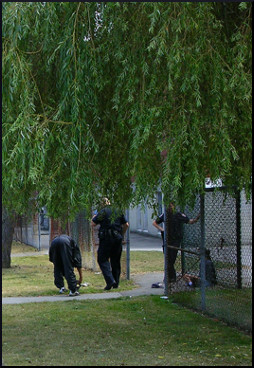
One of the traditions of House the Homeless (founded in 1989) is the survey through which people experiencing homelessness in Austin, Texas, can go on record about various matters that affect their lives. The questions were composed by the organization’s president and founder, Richard R. Troxell, who is also Director of Legal Aid for the Homeless.
This year’s topic, presented at the annual Thermal Underwear Distribution Party, was “Protect and Serve,” and concerned interactions with the police. One word instantly springs to mind when describing the results: appalling.
277 participants, averaging 45 years of age, answered the questions, with about four times as many males as females responding. A lot of mistreatment is the petty kind of stuff that housed people rarely encounter, like being told to “move along” when in a public place. Then, there is another tier of harassment, revealed in answer to the question, “Did you ever get a ticket, go to court, then be told your ticket is not in the system yet and you would have to return?”
The Community Court system is supposed to be an improvement on the old way of handling minor crime, but in far too many cases, as Richard notes, it “actually hinders their ability to change their condition of being homeless.” Here is how he puts it:
We have been told that people have often had to return to the court multiple times before a ticket is reported to the court. If a person is unable to coordinate their response with the submittal of the ticket, then it will “go to warrant.” This will result in the arrest of the individual for what was otherwise only a class C ticket, equivalent to a parking ticket.
When you don’t have a car or a telephone or a computer; when there is no secure place to store your belongings; when you don’t have the right clothes or accessories to protect yourself from the weather; when you don’t know where your next meal will come from or where you will sleep that night; when you are physically disabled or suffering from mental illness— EVERYTHING is enormously difficult.
So, what does the system do? Too often, it responds by demanding that you show up somewhere that is hard to get to, dragging everything you own along because there is no safe place to leave it. You have to walk a long way, or wait for transportation that you might be unable to pay for—and don’t even think about trying to break the law against hitch-hiking. You have to get there on time, regardless of how hot or cold it is outside, or how much pain you may be having.
It Gets Worse
And then, too often, the system says you have to come back because, through no fault of your own, the system isn’t ready for you. Or it punishes you for not knowing you were supposed to show up, or insists on your attendance at some place far from the nearest food source and at the wrong time of day to make it back in time to eat or even worse, to sign up for a bed. And if you have one or more children to worry about, everything is exponentially more demanding.
It’s as if the system is deliberately and maliciously designed to crush the spirit and drain the last ounce of energy and hope from a person—and Austin is a model city, better than a lot of other American cities by many orders of magnitude. Imagine what hellish places some of them must be! Austin’s No Sit/No Lie ordinance is shining example of compliance with the Americans with Disabilities Act—and yet, even that hard-won, monumental victory has not succeeded in compelling the police to always do the right thing.
The Protect and Serve Survey results were sent, along with a cover letter written by Richard R. Troxell, to Austin’s City Manager, Police Chief, Mayor, Mayor Pro Tem, City Council members, Public Safety commissioners, Human Rights commissioners, and to the National Coalition for the Homeless— and future posts will have more to say about it.
Image by Picture 084


